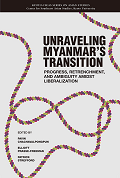
Unravelling Myanmar’s Transition:
Progress, Retrenchment, and Ambiguity Amidst Liberalization
Pavin Chachavalpongpun, Elliott Prasse-Freeman, and Patrick Strefford, eds.
Published in February, 2020
Kyoto University Press & NUS Press
Description
The optimism provoked by Myanmar’s political reforms in 2011-2012 has now given way to a sense that the uneven nature of change in this nation of 54 million has led to instability and uncertainty.
The liberalization of critical sectors and expansion of certain freedoms―such as political and legal opportunities for expression and mobilization―contrasts with the entrenchment of structural problems. It becomes ever more difficult to tackle ethnic marginalization and conflict, over-dependence on natural resource extraction, inadequate public services, and problems of under-capacity in the civilian bureaucracy.
The result is the build up of a toxic environment in which classism, racism, and bigotry threaten to rend Myanmar’s already delicate social fabric.
The contributors to this volume bring unique perspectives and methodologies to bear to unravel Myanmar’s tangled challenges. Whether it is through studying corruption by analyzing the country’s real estate bubble, assessing civil society advocacy capacity against extractive industries, or gauging the strength – and surprising weakness – of Myanmar’s military, the volume employs unconventional approaches and analytical rigor to address a fundamental question: is Myanmar itself unraveling?